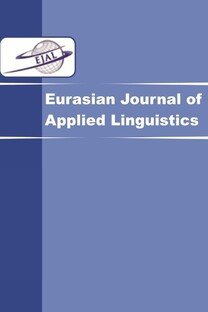Poetic identity in second language writing: Exploring an EFL learner's study abroad experience
___
Bishop, W. (1997). Teaching lives. Logan, UT: Utah State University Press.Chamcharatsri, P. B. (2013a). Emotionality and second language writers: Expressing fear through narrative in Thai and in English. L2 Journal, 5(1), 59-75.
Chamcharatsri, P. B. (2013b). Poetry writing to express love in Thai and in English: A second language (L2) writing perspective. International Journal of Innovation in English Language Teaching, 2, 142-157.
Hanauer, D. I. (2004). Poetry and the meaning of life. Toronto, ON: Pippin.
Hanauer, D. I. (2010). Poetry as research: Exploring second language poetry writing. Amsterdam: John Benjamins.
Hanauer, D. I. (2012). Meaningful literacy: Writing poetry in the language classroom. Language Teaching, 45, 105-115. http://doi.org/ck442q
Hanauer, D. I. (2014). Appreciating the beauty of second language poetry writing. In D. Disney (Ed.), Exploring second language creative writing: Beyond babel (pp. 11-22). Amsterdam: John Benjamins.
Iida, A. (2008). Poetry writing as expressive pedagogy in an EFL context: Identifying possible assessment tools for haiku poetry in EFL freshman college writing. Assessing Writing 13, 171-179.
Iida, A. (2010). Developing voice by composing haiku: A social-expressivist approach for teaching haiku writing in EFL contexts. English Teaching Forum, 48, 28-34.
Iida, A. (2012). The value of poetry writing: Cross-genre literacy development in a second language. Scientific Study of Literature 2, 60-82. http://doi.org/bfdt
Iida, A. (2016). Exploring earthquake experiences: A study of second language learners' ability to express and communicate deeply traumatic events in poetic form. System, 57, 120-133. http://doi.org/bfdv
Iida, A. (in press). Expressing study abroad experiences in second language haiku writing: Theoretical and practical implications for teaching haiku composition in Asian EFL classrooms. In H. J. Widodo, A. S., Wood, D. Gupta, & W. Cheng (Eds.), Asian English language classrooms: Where theory and practice meet. New York: Routledge.
Ivanic, R. (1998). Writing and identity: The discoursal construction of identity in academic writing. Amsterdam: John Benjamins.
Kramsch, C. (2006). Preview Article: The multilingual subject. International Journal of Applied Linguistics, 16(1), 97-110.
Langer, C. L., & Furman, R. (2004). Exploring identity and assimilation: Research and interpretive poems [19 paragraphs]. Forum Qualitative Sozialforschung / Forum: Qualitative Social Research 5(2), Art. 5, Retrieved from http://bit.ly/1QjW5Ex
Norton, B. (1997). Language, identity, and the ownership of English. TESOL Quarterly, 31, 409-429.
Norton, B., & McKinney, C. (2011). An identity approach to second language acquisition. In D. Atkinson (Ed.), Alternative approaches to second language acquisition (pp. 73-94). New York: Routledge.
Norton, B. (2013). Identity and language learning: Extending the conversation (2nd ed.). Bristol: Multilingual Matters.
Park, G. (2013). My autobiographical-poetic rendition: An inquiry into humanizing our teacher scholarship. L2 Journal, 5(1), 6-18.
Pavlenko, A. (2001). "In the world of the tradition, I was unimagined": Negotiation of identities in cross-cultural autobiographies. The International Journal of Bilingualism, 5, 317-344.
Pavlenko, A. (2007). Autobiographic narratives as data in applied linguistics. Applied Linguistics, 28, 163-188.
Sky Hiltunen, S. M. (2005). Country Haiku from Finland: Haiku meditation therapy for selfhealing. Journal of Poetry Therapy, 18(2), 85-95.
Spiro, J. (2014). Learner and writer voices: Learners as writers and the search for authorial voice. In D. Disney (Ed.), Exploring second language creative writing: Beyond babel (pp. 23- 40). Amsterdam: John Benjamins.
Wenger, E. (1998). Communities of practice: Learning, meaning, and identity. New York: Cambridge University Press.
- ISSN: 2149-1135
- Yayın Aralığı: 3
- Başlangıç: 2015
- Yayıncı: Ece Zehir Topkaya
Poetic identity in second language writing: Exploring an EFL learner's study abroad experience
Andrzej CİROCKİ, Raichle FARRELLY
Review of Exploring Psychology in Language Learning and Teaching
Poetic identity in second language writing: Exploring an EFL learner's study abroad experience
Review of Motivational Currents in Language Learning: Frameworks for Focused Interventions
Research and reflective practice in the EFL classroom: Voices from Armenia
Andrzej CİROCKİ, Raichle FARRELLY
Poetic identity in second language writing: Exploring an EFL learner’s study abroad experience
